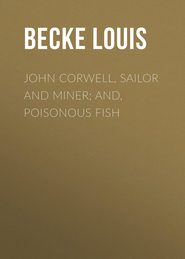По всем вопросам обращайтесь на: info@litportal.ru
(©) 2003-2024.
✖
Rodman The Boatsteerer And Other Stories
Настройки чтения
Размер шрифта
Высота строк
Поля
The other child, a boy, was drowned at sea. For eight or nine years Rimé and his Tahitian wife, Tiaro, lived alone on the great plantation; then Tiaro sickened and died, and Rimé was left by himself. Then one day came news to him from the distant Paumotus—his daughter and her white husband had fallen victims to the small-pox, leaving behind them a little girl. A month later Rimé worked his way in a pearling schooner to the island where his granddaughter lived, and claimed her. His heart was empty he said. They would go to Mâdurô, though so many long, long years had passed since he, then a strong man of thirty, had seen its low line of palm-clad beach sink beneath the sea-rim; for he longed to hear the sound of his mother tongue once more. And so the one French priest on Marutea blessed him and the child—for Rimé had become a Catholic during his stay in the big plantation—and said that God would be good to them both in their long journey across the wide Pacific to far-off Mâdurô.
But changes had come to Mâdurô in forty years. When Rimé had sailed away to seek his fortune in Tahiti he and his people were heathens; when he returned he found them rigid Protestants of the Boston New England Cotton-Mather type, to whom the name of “Papist” was an abomination and a horror. And when Rimé said that he too was a Christian—a Katoliko—they promptly told him to clear out. He was not an American Christian anyway, they said, and had no business to come back to Mâdurô.
“And,” said Macpherson, “I’ll no suffer this—the poor creature an’ the wee lit child canna git a bit to eat but what I gie them. And because I do gie them something to eat Lilo has turned against me, an’ says I’m no a Christian. So I want ye to come ashore and reason wi’ the man. He’s but a bigot, I fear; though his wife is no so hard on the poor man and the child as he is; but a woman aye has a tender heart for a child. And yet, ye see, this foolish Rimé will no give in, and says he will die before he changes his faith at Lilo’s bidding. They took awa’ his silly brass cruceefix, and slung it into the lagoon. Then the auld ass made anither out of a broken canoe paddle, and stickit the thing up in my cook-shed! And I have no the heart to tell him to put it in the fire and warm his naked shin bones wi’ it. But I think if we all tackle the native teacher together we may knock some sense into his conceited head, and make him treat the poor man better. ‘Tis verra hard, too, on the poor auld fellow that these people will not give him back even a bit of his own land.”
Then he went on to say that ever since Rimé had landed he and the child had been sleeping every night in his (Macpherson’s) cooking-shed. The trader had given him a bundle of mats and free access to a pile of Fiji yams and a bag of rice, and sometime Louisa, Lilo’s Hawaiian wife, would visit them at night, ostensibly to convert Rimé from the errors of Rome, but really to leave him a cooked fish or a piece of pork. Most of the day, however, Rimé was absent, wandering about the beaches with his grand-daughter. They were afraid to even pass near the village, for the children threw stones at them, and the men and women cursed them as Katolikos. Matters had gone on like this till two weeks before the Palestine arrived, when Lilo and some of his deacons had formed themselves into a deputation, and visited the trader. It was very wrong of him, they said, to encourage this wicked old man and his child. And they wanted him to cease giving them food or shelter—then when the “Katolikos” found themselves starving they would be glad to give up the “evil” religion which they had learnt in Tahiti. Then would they be baptized and food given them by the people of Mâdurô.
Macpherson tried to reason with Lilo. But neither he nor the white-shirted, but trouserless, deacons would listen to him. And furthermore, they gave him a warning—if Rimé continued obstinate, they would hold him (Macpherson) responsible and tapu his store. Rimé did continue obstinate, and next morning the trader found himself tabooed, which is a mere euphemism for boycotted.
“That’s pretty rough on you, Mac,” said Packenham.
“‘Twill just ruin me, I fear. Ye see there’s four other traders on this island besides me, and all my business has gone to them. But what can I do? The silly auld fule of a Rimé won’t give in, and I canna see him starve—the damned auld Papist.”
At noon, as Packenham, with his supercargo and Macpherson, stepped out of the trader’s dwelling, and walked together to the Mission House, a native went through the village blowing a conch. Lilo had agreed to meet the white men and discuss matters with them. Already the big room in the teacher’s house was filled with people, who sat around the walls three or four deep, talking in whispered tones, and wondering why the white men troubled so much over a miserable old man and a wretched child, who were both accursed “Katolikos.”
As the captain and his friends entered, Lilo, the teacher, advanced to meet them. He was a small, slenderly built man, with a skin scarcely darker than that of an Italian, and very handsome features. After a few words of effusive welcome, and a particularly sweet smile to Macpherson, he escorted the white men to their seats—three chairs placed together at the head of the room.
Presently there was a shuffling of naked feet outside, and five or six young men entered the house, pushing before them an old man and a girl—Rimé and his grand-child. In the centre of the room was a small square mat of coconut leaf—the Marshall Island prisoners’ dock. With limbs trembling with age, Rimé seated himself cross-legged; the child, kneeling at his back, placed her bony arms around his wrinkled body, and clasped him tightly; her eyes, big, black, and mournful, filled with the indifference born of despair. Then, as she saw Macpherson, a faint semblance of a smile flitted across her sallow face.
Lilo struck his hand upon a little table before which he sat, and at once the assembly was silent. Then he turned to Packenham and, in perfect English, pointing to the two figures in the centre of the room, said—
“That is Rimé and his child. They have given us much trouble, and I and the deacons of this island do not want trouble. We are Christians, and will not have any ‘Katolikos’ here. Mr. Macpherson says we are cruel. He is wrong. We are just, and this man and this child must give up their false faith. But because you and Mr. Denison have written me a letter about this matter I have called the people together so that we may talk. So, if you please, captain, will you speak, and I will interpret whatever you say to the people.”
“Will he, the damned little sweep?” muttered the supercargo to Packenham; “tell him that we can talk Mâdurô as well as he can—and better.”
So, much to the teacher’s disgust, Packenham answered in the Mâdurô dialect. “‘Twas better,” he said, “that they should all talk Mâdurô.” Lilo smiled unpleasantly, and said, “Very well.”
Then Packenham, turning to the people, spoke to the point.
“Look into my face, people of Mâdurô, and listen to my words. Long before the missionaries came to this island I lived among ye for three years with my wife Nerida. And is there here one man or one woman who can say that I ever lied to him or her? So this do I say to ye all; and to thee, Lilo, the teacher of the Word of God, that ye do wrong to persecute this old man and this child. For is it not true that he hath land, which ye have denied to him? Is it not true that he is old and feeble, and his limbs tremble as he walks? Yet ye neither give him food nor drink, nor yet a mat whereon to lie his head. He is a ‘Katoliko,’ ye say? Are there not many thousands of ‘Katolikos’ in Hawaii, the land from whence comes Lilo? And I ask of thee, Lilo, do they suffer wrong from the King and the chiefs of Hawaii because of their faith? So to thee, Lilo, do I say ‘beware.’ Thou art but a young and ignorant man, and were I to tell the white missionaries in Honolulu (who are thy masters) that this old man and this little child would have died of hunger but that the heart of one man alone was tender to them, then wouldst thou hang thy head in shame when the mission ship comes here next year. For hath not Christ said, ‘Blessed are the merciful, for they shall obtain mercy?’ And so I say to ye all, let this old man dwell among ye in peace, for death is near to him, and shame will be thine if ye deny to him his right to die on his own land, of which ye have robbed him.”
The teacher sprang to his feet, his dark eyes blazing with passion.
“There shall be no mercy shown to Katolikos; for they are of hell and the devil and his works!” and from the people there came a deep growl of approval, which changed into a savage hissing as Macpherson rose and stretched out his hand.
“Let me speak,” he said.
“No,” shouted the teacher. “Who are you? You are a bad man, you are–”
Packenham made two strides over to Lilo and placed his heavy hand on his shoulder—“Sit down, you damned little psalm-singing kanaka hog, or I’ll knock your eye out. He shall speak.”
“Get thee hence, thou shielder of the devil’s children,” said a young, fat deacon, walking up to the trader and spitting contemptuously at his feet. “We want no such white men as thee among us here in Mâdurô.” In an instant Macpherson struck him between the eyes and sent him flying backwards among his fellow-deacons. Then came an angry roar from the people.
The trader turned to Packenham with a groan, “I’m a ruined man now, Captain Packenham, and all through this auld fule of a Papist.” Then he again tried to speak amidst the uproar.
“Sit down, damn you,” said Denison, the supercargo, “and don’t excite them any more. They’re ready for any mischief now. Oh, you she-devil,” and he darted into the middle of the room towards Rimé and his grand-daughter. A stout muscular girl had torn the child’s arms from the old man’s waist, and was beating her savagely in the face with clenched fists. Denison gave her an under-clip on the jaw and sent her down, and in a few seconds the old man and child were the centre of a struggling group—the white men hitting out right and left to save them from being murdered. The teacher’s wife, a tall, graceful young woman—with whom Denison had been exchanging surreptitious glances a few minutes before—weeping copiously the while, aided them by belabouring the backs of the women who were endeavouring to get at the prostrate figure of the little girl. But Packenham, Macpherson, and the supercargo were too much for the natives, and soon cleared a space around them.
“Take them to the ship, Captain Packenham,” said the teacher’s wife pantingly, in English. “These people are mad now. Go—go at once.”
Picking up the frail figure of the old man, the captain, followed by Macpherson and the supercargo, soon gained the boat through a shower of stones and other missiles. Ten minutes later they were on board the Palestine.
“What a devil of a row!” said Packenham, as he clinked his glass against that of Macpherson, who, after the exciting events of the past hour, had been induced to take a nip to steady his nerves; “you ought to be d–d well ashamed of yourself, Mac, to be mixed up in a fight over a Papist. What would Mr. MacBain say, eh?”
“It’s a verra bad business for me,” said Macpherson ruefully. “Ye’ll have to come back for me next month and tak’ me awa’ from Mâdurô. I’ll do no more business here, I can see.”
“Right you are, Mac,” and Packenham grasped his hand. “I will come back for you, if it takes me a month of Sundays to beat against the trades. And you’re a white man, Mac; and I’ll never laugh at MacBain nor Aberdeen theology any more.”
That night, as the captain of the Palestine slept upon the skylight, old Rimé, who, with the child, lay upon the deck just beneath Packenham, rose softly to his knees and peered into the white man’s face. He was sleeping soundly. Rimé touched his grandchild with his foot. She awoke, and together they pressed their lips to the skipper’s hand. Then, without a sound, they stole along the deck, clambered over the brig’s low side, dropped into the water and swam ashore.
When daylight came the Palestine was rolling heavily to a sweeping westerly swell, with the wind piping hard through her cordage as she strained at her cable. The absence of old Rimé and the child was not discovered till coffee time; the mate thought they had gone to sleep in the hold.
“They’ve swum ashore in the night, Pack,” said the supercargo to Packenham. “I believe the old fellow will be content to die of starvation—hallo, here’s Mac coming off in his boat!”
In less than ten minutes the trader’s boat was close to the ship, and Macpherson, bringing her up to the wind close under the brig’s stern, hailed Packenham.
“Hae ye seen anything of the old man Rimé?”
“No,” answered the captain; “the old fool cleared out last night. Isn’t he on shore?”
“No. And there’s a canoe missing from the beach, and I believe the auld Papist fule has taken the wee bit lassie wi’ him, and thinks he can get to Ponape, whaur there’s ‘Katolikos’ in plenty. And Ponape is sax hundred miles awa’.”
“Well, come aboard and get some breakfast.”
“Man, I’m going after the old fule! He’s got no sail and canna be twenty mile awa’. I’ll pick him up before he gets to Milli Lagoon, which is only saxty miles from here.”
Packenham swore. “You infernal ass! Are you going to sea in a breeze like this by yourself? Where’s your crew?”
“The deevils wadna’ come wi’ me to look for a Papist. And I’m not going to let the auld fule perish.”
“Then come alongside and take a couple of our Savage Island boys. I can spare them.”
“No, no, captain. I’m not going tae delay ye when ye’re bound to the eastward and I’m going the ither way. Ye’ll find me here safe enough when ye come back in anither month. And I’ll pick up the auld deevil and the wee bit lassie before mid-day.”
And then, with his red beard spreading out across his shoulders, Macpherson let his boat pay off before the wind. In an hour he was out of sight.
Three weeks afterwards the Sadie Perkins sperm whaler of New Bedford, came across a boat, five hundred miles west of Mâdurô. In the stern sheets lay that which had once been Macpherson, the “auld fule Papist, and the wee bit lassie.”
A MAN OF IMPULSE
Blackett, the new trader at Guadalcanar in the Solomons, was entertaining a visitor, an old fellow from a station fifty miles distant, who had sailed over in his cutter to “have a pitch” with his nearest white neighbour. And the new man—new to this particular island—made much of his grizzled visitor and listened politely to the veteran’s advice on many subjects, ranging from “doctoring” of perished tobacco with molasses to the barter of a Tower musket for a “werry nice gal.”
The new trader’s house looked “snugger’n anything he’d ever seed,” so the old trader had told him; and Blackett was pleased and very liberal with the liquor. He had been but a few months on the island, and already his house was furnished, in a rude fashion, better than that of any other trader in the region. He was a good host; and the captains of the Fiji, Queensland, and Samoan “blackbirders” liked to visit him and loll about the spacious sitting-room and drink his grog and play cards—and tell him that his wife was “the smartest and prettiest woman in the group.”
Blackett was especially vain of the young Bonin Island half-caste wife who had followed his varying fortunes from her home in the far north-west Pacific to the solitary, ghostly outlier of Polynesia—lonely Easter Island, and thence to and fro amongst a hundred other islands. He was vain of her beauty—the beauty that had led him to almost abandon any intention of returning to civilisation; he was vain of the dark, passionate eyes, the soft, wavy hair, and the proud little mouth inherited from her Lusitanian father. Of this latter person, however, neither Blackett nor Cerita, his wife, were over-proud—he was a notorious old scamp and ex-pirate, even for that part of the Pacific, and Cerita knew that Blackett had simply bought her from him as he would buy a boat, or a bolt of canvas.
Blackett, finding it impossible to make old Hutton drunk or get him to turn in, resigned himself entirely to the old pirate, who, glancing to the far end of the room, to where Cerita and his own wife, a tall, lithe-limbed Aoba woman, were lying together on a mat smoking cigarettes, proceeded to pour out the story of his countless murders and minor villainies.
Blackett himself was a negatively-moral man. He could shoot a native if necessity demanded, but would not do so hastily; and the old trader’s brutal delight in recounting his pot-shots only excited a disgust which soon became visible in his face.











